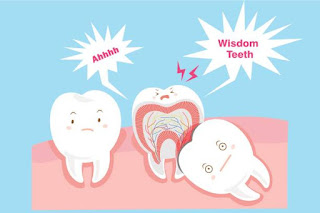The Keys To The Extraction Of Wisdom Teeth
Toothache is one of the most common dental emergencies. In many cases, their growth alters the rest of the teeth and it is best to extract them. But when do we have to extract the wisdom teeth? What care should we maintain?
 |
| Extraction Of Wisdom Teeth |
Check out this masterpeice:-
- Apple cider vinegar hair rinse before or after conditioner
- Herpes on tongue
- Side effects of carbonated water
Also known as third molars, they have that popular name by the time they are developed: from 18 years old.
From then on pain may arise from one day to the next, because the molars are erupting. In most cases, its growth can alter the position of the teeth, which is why its extraction is recommended.
In case of noticing severe pain it is advisable to go to the dentist when before.
Toothache is usually one of the most common dental emergencies. In many cases it appears from one day to the next without prior notice.
But in what situations is it preferable to extract the wisdom teeth?
- It is impossible to place the tooth in the arch so that it performs its functions correctly.
- There is a pathology associated with the development of the wisdom tooth, such as infectious processes, cysts, etc. that can not be treated with conservative methods.
- The third molars have not finished erupting completely , remaining semi-enclosed and partially covered by the gums. This situation facilitates the accumulation of food debris and bacteria, which leads to an infection.
- The molars have grown in a defective position. For example, crooked, a position that usually alter the rest of teeth. This is especially serious in patients who have undergone orthodontics , since the results could be altered.
- Some practical tips after removing wisdom teeth
- If wisdom teeth are finally removed, there are several guidelines to follow to speed recovery and relieve pain:
Rinsing the wound is one of the most recommended. During the first days it is advisable to avoid the mouthwash , especially if it contains alcohol.
An alternative is to rinse with a mixture of water and salt, which can cause discomfort but promotes wound healing. It is also essential not to neglect oral hygiene.
In fact there are many professionals who recommend avoiding brushing during the first hours. The most important thing is to avoid pressure around the intervened area and perform smooth and rotating movements with the brush.
And what can I do to relieve the pain? To reduce inflammation and relieve pain it is advisable to use ice (always on the cheek) and some anti-inflammatories.











No comments: